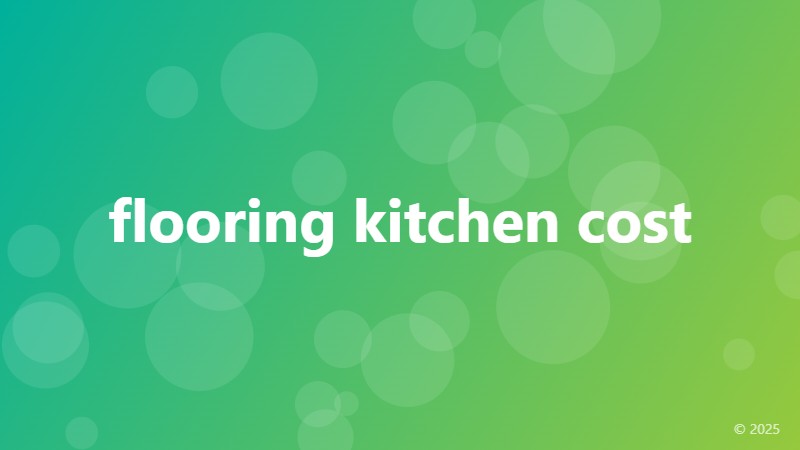flooring kitchen cost

Understanding Flooring Kitchen Cost: A Comprehensive Guide
When it comes to renovating or building a kitchen, one of the most crucial aspects to consider is the flooring. Not only does it add aesthetic appeal to the space, but it also plays a significant role in functionality and durability. However, with so many options available, understanding the flooring kitchen cost can be overwhelming. In this article, we'll delve into the various types of kitchen flooring, their costs, and factors that influence the final price.
Types of Kitchen Flooring and Their Costs
Kitchen flooring options are diverse, each with its unique characteristics, advantages, and price points. Here are some of the most popular types of kitchen flooring and their estimated costs:
Hardwood Flooring: Hardwood flooring is a timeless choice for kitchens, offering warmth and sophistication. The cost of hardwood flooring varies depending on the type of wood, with prices ranging from $3 to $15 per square foot.
Laminate Flooring: Laminate flooring is a cost-effective alternative to hardwood, mimicking its appearance at a fraction of the cost. Prices for laminate flooring start at around $0.50 per square foot.
Ceramic or Porcelain Tiles: Ceramic or porcelain tiles are popular for kitchens due to their durability and ease of maintenance. The cost of ceramic or porcelain tiles ranges from $1 to $20 per square foot.
Natural Stone Flooring: Natural stone flooring, such as marble, granite, or slate, adds luxury to any kitchen. The cost of natural stone flooring varies widely, with prices starting at around $5 per square foot.
Vinyl Flooring: Vinyl flooring is a budget-friendly option, offering a range of styles and patterns. The cost of vinyl flooring starts at around $0.25 per square foot.
Factors Influencing Flooring Kitchen Cost
Besides the type of flooring, several factors can influence the final cost of your kitchen flooring project:
Size of the Kitchen: The larger the kitchen, the more flooring material you'll need, resulting in higher costs.
Installation Method: The installation method can greatly impact the cost, with professional installation typically more expensive than DIY installation.
Material Quality: The quality of the flooring material can significantly affect the cost, with high-end materials being more expensive than budget-friendly options.
Location: The location of your kitchen can influence the cost of flooring, with urban areas often having higher prices than rural areas.
Conclusion
In conclusion, understanding the flooring kitchen cost is crucial to planning a successful kitchen renovation or build. By considering the various types of kitchen flooring, their costs, and factors that influence the final price, you can make an informed decision that fits your budget and meets your needs. Remember to research, compare prices, and consult with professionals to ensure you get the best value for your money.